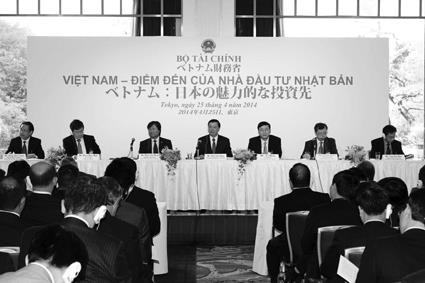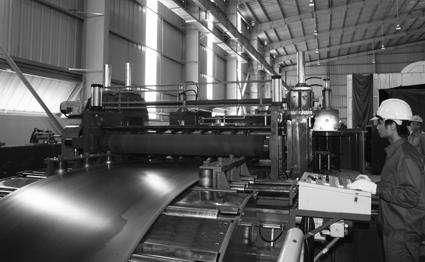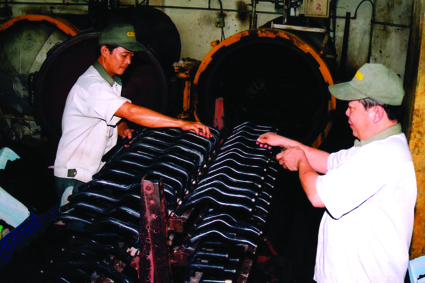|
The Party Central Committee’s Economic Commission held early this month a seminar titled “Promoting the role of state-owned enterprises (SOEs) in the socialist-oriented market economy” as a forum for economists, managers and stakeholders to discuss and evaluate the process of SOE renewal and reorganization. Following are main points of the opening speech delivered by Vuong Dinh Hue, head of the Central Party Committee’s Economic Commission at the seminar. |
 |
Current situation of SOEs
After more than a decade of implementing various Party resolutions on SOEs, many important achievements have been obtained.
The state enterprise sector is undergoing the renewal process and despite that its contribution to the country’s GDP has gradually decreased from 34.72 percent in 2009 to 32.4 percent in 2013, the sector still plays a dominant role in many key industries and focuses more on key fields and important areas. The SOE system is being renewed and reorganized to further develop and improve its business efficiency.
By the end of 2013, more than 6,300 SOEs had been reorganized, of which 3,659 had been equitized; 1,033, transformed into one-member limited liability companies; and the rest undergone other forms of reorganization such as dissolution, bankruptcy, and merger and acquisition.
Regarding the restructuring process, by the end of last year, 85 among 91 state groups and corporations had prepared their own restructuring plans, of which 68 have been approved.
At present, the country has 949 wholly state-owned enterprises organized in the form of one-member limited liability companies, of which 54 percent are locally managed enterprises, 36 percent operate under the umbrella of ministries and sectors, and 10 percent belong to state economic groups. By function, 65 percent of these SOEs conduct business activities while the rest are agricultural and forest farms, public-utility enterprises or operate to serve security and national defense tasks.
Of 63 provinces and cities nationwide, 32 no longer have SOEs that merely conduct business activities.
Besides, there are still 1,217 companies in which the State holds dominant shares.
Statistics show that, by the end of 2012, SOEs, with total assets valued at VND 2,570 trillion and equity capital of VND 1,019 trillion, earned a total of VND 1,709 trillion in turnover and VND 167 trillion in pre-tax profit, and paid VND 222 trillion into the state coffer. In 2013, state groups, corporations and commercial banks contributed VND 297 trillion to the state budget, accounting for 36 percent of total state budget revenues. The year 2013 also saw 17 out of 18 largest state groups and corporations reported profits with a return-on-equity ratio of 16.13 percent and a debt-to-equity ratio of 1.3.
Basically, SOEs, especially state economic groups, corporations and commercial banks, have made significant contributions to boosting socio-economic development, forming key industries and accelerating the economic restructuring process. They have played an important role in stabilizing the macro-economy, performing defense and security tasks, implementing social welfare policies and remedying consequences of natural disasters.
However, SOEs still fail to fulfill their role as the core of the state economy sector, revealing many shortcomings and weaknesses in their performance.
First, SOEs’ productivity and production and business efficiency remain low. According to the World Bank’s figures, during 2000-2008, the productivity gap between SOEs and enterprises of other sectors had been widened from 1:4 to 1:10. The revenue-per-employee ratio of SOEs had just increased from 0.6 to 1.7, while the figure had jumped from 2.7 to 16.3 for the enterprise sector as a whole.
Second, SOEs’ contributions to the society still fail to correspond to the resources they are holding. Though SOEs are now using 70 percent of the land resources, 70 percent of the official development assistance sources reserved for the whole production and business sector and 60 percent of credit of the national economy, they contribute just about 32 percent of the country’s GDP. Some SOEs are operating at a loss and involved in corruption and waste, causing great losses to state property and public concerns.
Third, the results of restructuring SOEs remain modest. Competent authorities are seemingly confused as how to formulate institutions and models of state ownership representatives at SOEs. Their corporate governance still fails to conform to international practice and standards, while the mechanisms for supervising and evaluating SOEs’ performance reveal many limitations.
Solutions
The Vietnamese Communist Party and State advocate the development of a socialist-oriented economy with varied forms of ownership and many economic sectors in which the state economy plays the dominant role. Lawful economic sectors, constitute important components of the economy, equal before law and cooperate and compete with one another for long-term development. In that context, the core role of SOEs in the state economy must be displayed in reality through their competitiveness in line with market rules, their contributions to the economy, their ability to drive the development of other economic sectors, and their superiority in technology renewal, management skills and, especially, human resource quality.
In a socialist-oriented market economy, enterprises of all economic sectors, including also SOEs, must operate under the market mechanism.
Competent authorities are making constant efforts to improve laws, mechanisms and policies so as to guarantee the right to freedom of enterprise under the Constitution, especially market entry procedures and market institutions. All mechanisms and policies that create inequality in business opportunities, access to resources and implementation of administrative procedures must be abolished.
The key role of SOEs must be institutionalized and realized in such business environment.
In order to promote the key role of SOEs, it is necessary to further accelerate their restructuring. SOEs should focus only on key fields and important areas and national defense and security.
The process of equitization of SOEs and sale of state capital amounts at enterprises in the non-core sectors should be stepped up on the market principles. Production and business activities should be separated from political and public-utility tasks.
The mechanism and model of exercising the rights of state ownership and state ownership representatives at SOEs as well as the legal framework, mechanisms and policies on investment and management of state capital at SOEs should be further improved. The management, supervision and inspection by the state owner should be increased.
The leading and managing staff of SOEs should be strengthened together with improving SOEs’ governance capacity. And last but not least, operation results of SOEs should be made public and transparent.-


